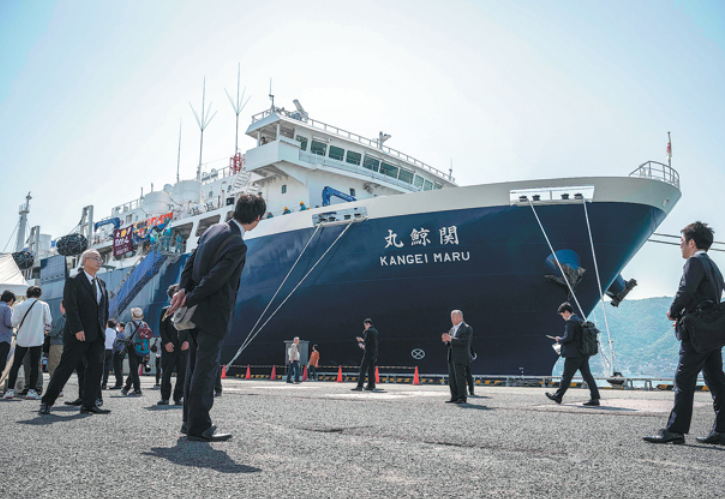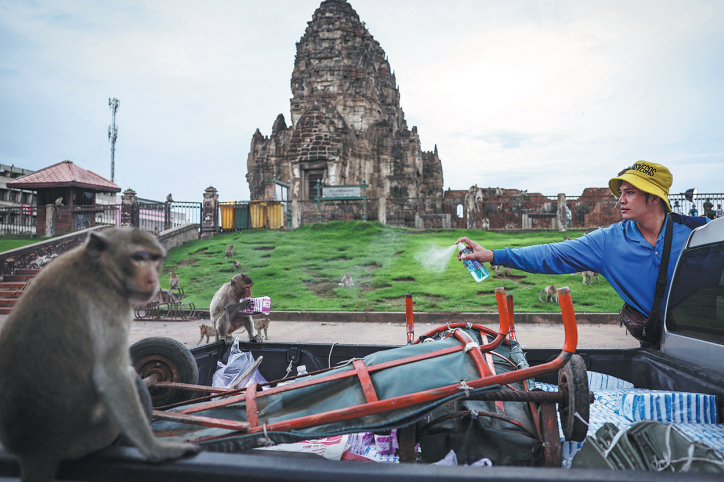Japan's new whaling ship sets sail amid controversy


The Kangei Maru, Japan's new whaling mother ship, embarked on its first hunting trip from Shimonoseki Port in Yamaguchi Prefecture on Tuesday.
During the flag-off ceremony, Hideki Tokoro, president of commercial whaling operator Kyodo Senpaku, which owns the Kangei Maru, emphasized the importance of the ship in preserving offshore mother ship whaling. The Kangei Maru is set to catch whales off the coast of the Tohoku region.
Mother ship whaling refers to the role of a larger vessel supporting smaller, more maneuverable craft that hunt whales and bring the carcasses back for processing and freezing.
Japan's whaling industry has faced numerous challenges in recent years.
Following an International Whaling Commission, or IWC, a moratorium on commercial whaling in 1982, Japan continued whaling under the guise of "research".
In 2014, the International Court of Justice ordered Japan to stop whaling in the Antarctic.
As a result, Japan withdrew from the IWC in 2019 and resumed commercial whaling along its coasts.
However, whale meat consumption in Japan is declining. Seen as an affordable protein source in the post-World War II period, sales peaked at about 230,000 metric tons in 1962. Since then, it has been replaced by other meats. Supply has since fallen to about 2,000 tons in recent years, according to Japan's Fisheries Agency.
Kyodo Senpaku has been catching Bryde's whales and sei whales, but the firm's production of whale meat remains around 1,600 tons. For the fiscal year ending March 2023, sales were 3.1 billion yen ($19.8 million) with an operating income of 200 million yen.
However, the construction cost of the Kangei Maru is expected to impose a heavy financial burden on Kyodo Senpaku.
Constructed at a cost of approximately 7.5 billion yen, the Kangei Maru has replaced the Nisshin Maru, the country's sole existing whaling mother ship, which had been in operation for more than 30 years before being retired last November.
The newly-built electric propulsion Kangei Maru is 112.6 meters long and 21 meters wide, and has a gross tonnage of 9,299 tons.
To promote Japan's whaling industry, stores with whale meat vending machines were launched last year in Tokyo, Yokohama and Osaka, with plans to expand to 100 stores nationwide.
On May 9, Japan's Chief Cabinet Secretary Yoshimasa Hayashi announced that the government would continue to promote whaling and take the necessary diplomatic steps to protect the industry.
The Fisheries Agency said it plans to include large fin whales in its allowed whaling targets. This would make them the fourth species to be hunted, after minke, sei and Bryde's whales.
Japan's plan to allow coastal whaling of large fin whales has sparked opposition from environmental groups, the Australian Broadcasting Corporation reported on May 10.
Lloyd Gofton, managing director of global pressure group Blue Planet Society, told the ABC that targeting fin whales is an extremely harmful practice, killing a vital part of the marine ecosystem for a food product that people no longer want or need.
Gofton said the Japanese people have significantly reduced whale meat consumption and using "tradition" as an excuse to promote whale meat is unacceptable.

































